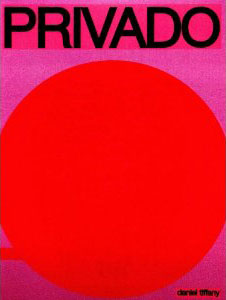
I first heard Daniel Tiffany’s name when the poet Peter Gizzi raved about his book Toy Medium: Materialism and Modern Lyric, a beautifully written scholarly study of lyric poetry (among many other things), which makes sense, since Gizzi is himself an accomplished lyric poet. It turned out that Tiffany, who teaches at USC, had been on the dissertation committee of a close friend of mine, who showed me his Infidel Poetics: Riddles, Nightlife, Substance, which particularly excited me because of its section on the obscure early 19th-century London underground radical abolitionist Robert Wedderburn, about whom I wrote half of my dissertation at SUNY Buffalo in the mid-1990s.
Tiffany is also a talented poet whose book Privado was published by Joyelle McSweeney and Johannes Göransson’s Action Books. All the poems in Privado are titled “Cadence,” and they’re interlaced with songs—called “jodies”—that military recruits chant in unison during training: “Hut toop threep fourp,” “Six to the front / And three to the rear / That’s the way / We do it here,” and so on, though some aren’t quite this obvious, and a few approximate baby babble—or an inability to speak the unspeakable. The idea is that here at the beginning of the second endless decade of the ongoing war on terror, this chant isn’t separate from us, but has been woven into our everyday lives, our private lives. In other words, it’s not the backdrop to, but the cadence of, current life in the United States.
So, too, is a disfigured beauty, and Tiffany’s clipped lyrical impulse indicates this as well. The poems in Privado ache to want, but they know—aesthetically, politically, ethically—partially to distrust this impulse: “They make me do things.” Everything is almost in danger of being taken away: “Living like there’s tomorrow.” In the meantime, Tiffany references breakfast cereal, economic bubbles, pop stars, and cherry blossoms. This world might be sexy if it weren’t also in decay. Through it all, the borderline maniacal chanted jodies come to infuse more than just military formations until desire gets swept into a bizarre reward system in conflict with what’s most human in us. Yet Tiffany’s poetry refuses to behave, to fall in line, with its broken phrases, neologisms, intentional misspellings, and crooked desire.
Alan Gilbert is the author of the poetry collections The Everyday Life of Design (Studio, 2020), The...
Read Full Biography

